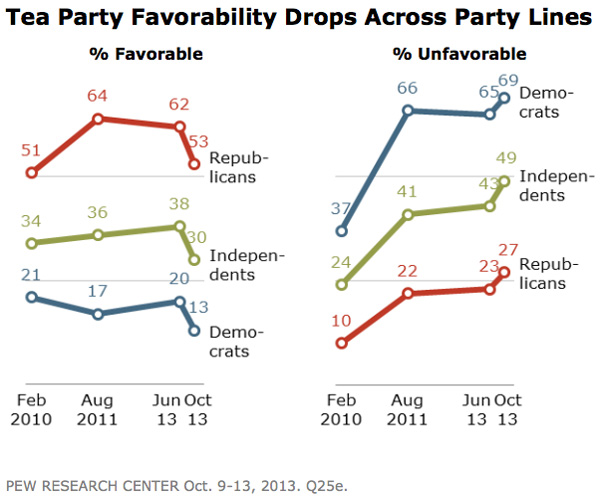Did Republicans learn their lesson from the government shutdown?
This could happen all over again in three months

A free daily email with the biggest news stories of the day – and the best features from TheWeek.com
You are now subscribed
Your newsletter sign-up was successful
The first government shutdown in 17 years is finally over. Shortly after midnight, President Barack Obama signed a bill that would reopen the government and extend the debt ceiling, ending more than two weeks of drama — thanks, in part, to the 87 House Republicans who voted with Democrats to pass it.
But don't expect to never hear the phrases "debt ceiling" or "government shutdown" again.
There were still 144 House Republicans who voted against ending the government shutdown. Even more worrying, the bill they were trying to stop only funds the government until Jan. 15 and only extends the Treasury's borrowing authority until Feb. 7, meaning Washington could be doing this all over again in three months.
The Week
Escape your echo chamber. Get the facts behind the news, plus analysis from multiple perspectives.

Sign up for The Week's Free Newsletters
From our morning news briefing to a weekly Good News Newsletter, get the best of The Week delivered directly to your inbox.
From our morning news briefing to a weekly Good News Newsletter, get the best of The Week delivered directly to your inbox.
"We've got to get out of the habit of governing by crisis," said Obama when the dust settled. It's not clear that every Republican got the message.
The Tea Party, instead of feeling chastened, claimed victory for having the courage to stand up to ObamaCare and government spending. And they don't seem like they are giving up the fight anytime soon.
"The battle lines remain the same," Rep. John Fleming (R-La.) told reporters. "If you think about it, we fought this thing to a stalemate." Those kind of statements shouldn't give hope to Democrats or moderate Republicans who are hoping to avoid this scenario in the future, wrote TIME's Zeke Miller:
[Tea Party Republicans] see the health care fight not as a teachable moment, but as a clarifying one. They fulfilled a campaign promise to their constituents by going to the mat against a law they cast in apocalyptic terms...This is the opposite of the lessons that many Republicans were hoping the GOP's fractious factions would learn from the episode. [TIME]
The movement's vocal leader, Sen. Ted Cruz (R-Texas), certainly learned a lesson: Rallying against ObamaCare is great for fundraising. The senator raised nearly $800,000 over the last quarter, almost double the amount from the quarter before.
A free daily email with the biggest news stories of the day – and the best features from TheWeek.com
But wait … isn't the Tea Party wing of the GOP becoming more unpopular? Yes, even among Republicans.

Polls also show that Republicans are in danger of losing seats in the House and are unlikely to gain seats in the Senate. None of that matters, however, unless the Tea Party Republicans feel like they will be punished for grinding the government to a halt.
Yes, voters might disapprove of the GOP as a whole. But, even if House Republicans lose a few seats in the next election, it's extremely unlikely that they would lose control of the House. That would put us in the exact situation for the next budget crisis: A Democratic president and Senate, and an embattled Republican-controlled House with lawmakers catering to their safely conservative districts.
That doesn't bode well for people tired of Washington "governing by crisis," argues Reuters' Felix Salmon:
We will have more sequesters, and more shutdowns, and more debt-ceiling fights, and eventually, in a statistical inevitability, we will fail to find some kind of way through the mess.
Remember that the sequester was initially put into place as a way to force the hand of any self-interested, logical group of politicians. They had to either come to an agreement — or face an outcome which was specifically designed to be as unpalatable to as many different interest groups as possible. And yet, despite the Sword of Damocles hanging over their heads, the politicians squabbled until it fell. [Reuters]
Democrats, who emerged from this fiasco looking like the adults in the room, are probably happy to watch a divided GOP drop precipitously in the polls. They didn't come out of the government shutdown smelling like roses, but, in a two-party system, they were the de facto winners of the last couple of weeks.
Instead, it's up to moderate Republicans to organize and make sure House Speaker John Boehner (R-Ohio) is representing them, not the Tea Party, if the country is going to avoid a never-ending string of budget crises.
"Mainstream conservatives can also be just as forceful and determined as the Cruz cult," wrote conservative Washington Post columnist Jennifer Rubin. "Fighting for the sake of fighting is not serving the constituents or the country or the conservative movement. Mainstream conservatives need to make this clear, and then go win some policy battles."
Keith Wagstaff is a staff writer at TheWeek.com covering politics and current events. He has previously written for such publications as TIME, Details, VICE, and the Village Voice.
-
 ‘My donation felt like a rejection of the day’s politics’
‘My donation felt like a rejection of the day’s politics’Instant Opinion Opinion, comment and editorials of the day
-
 Trump wants a weaker dollar but economists aren’t so sure
Trump wants a weaker dollar but economists aren’t so sureTalking Points A weaker dollar can make imports more expensive but also boost gold
-
 Political cartoons for February 3
Political cartoons for February 3Cartoons Tuesday’s political cartoons include empty seats, the worst of the worst of bunnies, and more
-
 The billionaires’ wealth tax: a catastrophe for California?
The billionaires’ wealth tax: a catastrophe for California?Talking Point Peter Thiel and Larry Page preparing to change state residency
-
 Bari Weiss’ ‘60 Minutes’ scandal is about more than one report
Bari Weiss’ ‘60 Minutes’ scandal is about more than one reportIN THE SPOTLIGHT By blocking an approved segment on a controversial prison holding US deportees in El Salvador, the editor-in-chief of CBS News has become the main story
-
 Has Zohran Mamdani shown the Democrats how to win again?
Has Zohran Mamdani shown the Democrats how to win again?Today’s Big Question New York City mayoral election touted as victory for left-wing populists but moderate centrist wins elsewhere present more complex path for Democratic Party
-
 Millions turn out for anti-Trump ‘No Kings’ rallies
Millions turn out for anti-Trump ‘No Kings’ ralliesSpeed Read An estimated 7 million people participated, 2 million more than at the first ‘No Kings’ protest in June
-
 Ghislaine Maxwell: angling for a Trump pardon
Ghislaine Maxwell: angling for a Trump pardonTalking Point Convicted sex trafficker's testimony could shed new light on president's links to Jeffrey Epstein
-
 The last words and final moments of 40 presidents
The last words and final moments of 40 presidentsThe Explainer Some are eloquent quotes worthy of the holders of the highest office in the nation, and others... aren't
-
 The JFK files: the truth at last?
The JFK files: the truth at last?In The Spotlight More than 64,000 previously classified documents relating the 1963 assassination of John F. Kennedy have been released by the Trump administration
-
 'Seriously, not literally': how should the world take Donald Trump?
'Seriously, not literally': how should the world take Donald Trump?Today's big question White House rhetoric and reality look likely to become increasingly blurred